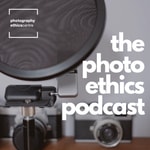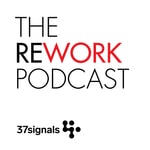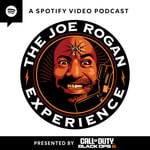The Photo Ethics Podcast – Details, episodes & analysis
Podcast details
Technical and general information from the podcast's RSS feed.

The Photo Ethics Podcast
Photography Ethics Centre
Frequency: 1 episode/28d. Total Eps: 66

This podcast is all about the ethics of photography. Each week we will hear from an accomplished photographer about what ethics means in their practice. We will talk about how these photographers have handled challenging situations, we will hear how their different experiences have shaped the way that they use their camera, and we will ask the big questions to find out why they photograph what they photograph. We will cover topics like consent, dignity, power, responsibility, impact, and collaboration. This podcast is hosted by Savannah Dodd, founder of the Photography Ethics Centre.
Recent rankings
Latest chart positions across Apple Podcasts and Spotify rankings.
Apple Podcasts
🇨🇦 Canada - visualArts
27/07/2025#94🇨🇦 Canada - visualArts
26/07/2025#73🇨🇦 Canada - visualArts
25/07/2025#61🇨🇦 Canada - visualArts
24/07/2025#40🇬🇧 Great Britain - visualArts
13/07/2025#70🇬🇧 Great Britain - visualArts
12/07/2025#43🇬🇧 Great Britain - visualArts
09/07/2025#87🇬🇧 Great Britain - visualArts
08/07/2025#55🇬🇧 Great Britain - visualArts
26/06/2025#73🇨🇦 Canada - visualArts
31/05/2025#95
Spotify
No recent rankings available
Shared links between episodes and podcasts
Links found in episode descriptions and other podcasts that share them.
See all- https://mermaidsuk.org.uk
28 shares
- https://haveibeentrained.com/
27 shares
- https://www.reuters.com/
26 shares
RSS feed quality and score
Technical evaluation of the podcast's RSS feed quality and structure.
See allScore global : 68%
Publication history
Monthly episode publishing history over the past years.
Aryan Musleh: Storytelling on social media
Season 5 · Episode 7
mercredi 4 septembre 2024 • Duration 38:38
In this episode, we talk with Aryan Musleh on storytelling on social media. He discusses the challenges of representing communities that are misrepresented or forgotten in the media, focusing on the political barriers that can hinder the efforts of photographers. As a curator, he explores the ethical complexity of ensuring that photographs he posts are used responsibly and represented accurately through captions.
What does photography ethics mean to Aryan?
“It means a lot to me. For example, it means representing people as they want to be represented, which is very important. And I would say it’s all about ethics, and it’s the cornerstone of having a community represented through visuals. It’s very basic, but it’s a steppingstone and a cornerstone of starting to tell a great story. And it has to be there. When a story lacks any ethical constraints, it’s not complete; it’s misrepresented; it’s biased; it’s all based on assumptions and cliches.” (36:22)
Links:
Photojournalism ethics courses
Nicole Tung: On navigating ethical dilemmas
Season 5 · Episode 6
mercredi 28 août 2024 • Duration 38:31
In this episode, we talk with Nicole Tung on navigating ethical dilemmas. She explores the responsibility a photographer has beyond taking a photo, discussing the investment she displays in the impact of her images. She examines the question of when to intervene as a photojournalist in a conflict zone, before talking about how the industry can better support freelancers doing this dangerous work.
What does photography ethics mean to Nicole?
“Photography ethics, for me, means, I think, the framework within which you yourself work as a photographer, how you navigate various situations and moral and ethical problems that will inevitably come up. I think that being very conscious of where you draw the line on what you’re willing to do, what you’re not willing to do if you’re confronted with a very problematic situation is something that I try to think ahead of before I work on a story, for example. And that I think comes with experience; I don’t think you can have that framework without spending the time doing this work. Certainly during my first year or two documenting conflict, I was still building that scaffolding, and it is something that you start to layer onto over the years because you encounter different things and you see different situations, and you also learn from the people around you. So it’s really about whether you can go home at the end of the day or the end of the assignment that you’re working on and feel that what you did was mostly okay.“ (35:01)
Links:
Shaminder Dulai: On troublemaking
Season 4 · Episode 9
mercredi 15 novembre 2023 • Duration 47:18
In this episode we talk with Shaminder Dulai about troublemaking. He describes how he navigates ethical considerations, both as a photo editor and as a photojournalist. He defines the difference between a “picture taker” and a “picture maker,” he discusses media literacy, and he describes the responsibilities that come with image making. Shaminder advocates for a kind of “troublemaking” by speaking up when you have questions or concerns.
What does photography ethics mean to Shaminder?
“I think for me the answer is: at the end of the day are you proud to put your name on this? Do you feel like you did right that day? Ethics is like, kind of like objectivity, it’s not a binary and its always changing, it’s always evolving, it’s a living creature in a lot of ways. Ethics today are very different than what they were 20 years ago, same as objectivity, same as our norms in the newsroom. And I think ethics, it’s that higher purpose, like, okay: are you doing right by the responsibility of the journalism? Have you done your due diligence? Have you avoided perpetuating harm? Have you avoided stereotypes? Have you made time for the people you are working with to fully understand what the story is? Have you advocated when you felt like you should have? Did you not stay silent because you were afraid of making waves? I think ethics are all part of that. It’s like character. It’s like at the end of the day, all that comes together and your byline is on it.” (44:33)
Links:
Environmental Photographer of the Year Award
“Photography Ethics: Putting Ethics into Practice” by Shaminder Dulai at VII Insider
Photovoice Worldwide: On expanding the frame
Season 4 · Episode 8
mercredi 8 novembre 2023 • Duration 46:00
In this episode we talk with Stephanie Lloyd and Erica Belli from Photovoice Worldwide about expanding the frame. They each explain how their distinct career trajectories led them to photovoice, and they describe why they find this research method valuable. They explore the ethical challenges that come with photovoice, and they also talk about the ethical challenges that photovoice aims to solve.
What does photography ethics mean to Erica?
“Photography ethics means so many things to me. I think the first thing that comes to mind is the idea that you have this tool in your hands, or you’re given this tool in your hands when it comes to photovoice, and you have to be responsible about it. It’s a bit about going into things with blinders or not. And deciding that you are going to think about the implications of a photo, you’re going to think not only of you taking this picture, but where is this pictures going to showcased, who is in this picture, what are the consequences for the person who is photographed, and where can this picture make change. There’s so many questions around photo ethics.” (41:57)
What does photography ethics mean to Stephanie?
“When I think about photovoice, I think about it as a social justice issue, so really through photography wanting to strive for diversity and equal representation involving groups that aren’t typically asked to share their opinions, and creating these opportunities for participants to share their voice and advocate for themselves and share what’s most important. … Photos are powerful tools, so making sure that through our photography that there is a piece of consideration here… While it can be such an important tool and something that can really uplift and share the power, making sure that we’re doing that in a way that’s respectful and that’s representative of groups and what they want to share.” (43:21)
Links:
“When Everything is Photovoice: Moving the conversation forward” by Daniela Miranda
“Taking an Anticolonial Approach to Photovoice: An interview with Dr. Jen Fricas”
Morwenna Kearsley: On ethics as comfort
Season 4 · Episode 7
mercredi 1 novembre 2023 • Duration 44:38
In this episode we talk with Morwenna Kearsley about ethics as comfort. She describes both her personal projects and her projects working with participants, focusing on ownership and control over the images that are produced. She discusses her choice to focus on making portraits of objects instead of making portraits of people, and she shares the ethical responsibilities she feels as a photographer in the age of the internet.
What does photography ethics mean to Morwenna?
“Well I think it is an ongoing conversation that you have with yourself and your practice, whatever form that practice takes. So for me it’s a conversation between myself, the materials that I use, the technologies that I use, and how that relates to the people that I’m working with and the places that I’m working within. It’s not something fixed … as the technologies of photography change and the applications of photography change, photography ethics must and does change with it. … For me, it’s just trying to be as aware as possible about what you’re doing, and, for me, to not make work that I’m uncomfortable making, not to put anybody else in a situation that I would not be comfortable in…“ (39:47)
Links:
Nilupa Yasmin: On unconscious bias
Season 4 · Episode 6
mercredi 25 octobre 2023 • Duration 45:17
In this episode we talk with Nilupa Yasmin about unconscious bias. Nilupa describes the conversations that have shaped her thinking around unconscious bias, accessibility, and representation. She explains why she makes work, how weaving has become an integral part of her practice, and how craft can be a form of activism. She goes on to discuss her approach to participatory work with communities, and she encourages artists to undertake training to ensure that they are well-equipped to take on their safeguarding responsibilities in that setting.
What does photography ethics mean to Nilupa?
“For me, ethics is having that common ground of understanding with the people that you are working with, or the subject that you’re working with, it doesn’t necessarily have to be people. But its also understanding that there is a lot of power in the camera, and while you’re the one that’s pointing it, you need to have that understanding in who they are and what they are comfortable sharing with you. … So I think it’s just being conscious at different varying points, and always understanding that these are real people that you’re working with. And like Anthony Luvera said, ‘be conscious of your unconscious bias.’” (40:09)
Links:
Daniel Regan: On (self) care
Season 4 · Episode 5
mercredi 18 octobre 2023 • Duration 45:43
In this episode we talk with Daniel Regan about (self) care. Daniel discusses how he approaches collaborative work with others and personal work about his own lived experience. He describes how he works with participants in collaborative projects to ensure that they are comfortable sharing their work, and how he makes decisions about sharing personal work about himself. Daniel explains that caring for one’s self is an important part of the process, and he describes the steps that he takes to care for himself during photographic projects.
What does photography ethics mean to Daniel?
“For me it’s about considering the impact that our images have on ourselves and on others. It’s not about going through the world just making because I want something, I need something, this is all about me. When we work with others, in particular, it’s about considering how other people that engage in our work feel. … So for me when I think about ethics, I think about how we care for the people that we work with and photograph, and we really think about what kind of experience do we want them to have?” (43:30)
Links:
Justin Carey: On solitude and collaboration
Jack Moyse: On understanding disability
Season 4 · Episode 4
mercredi 11 octobre 2023 • Duration 47:26
In this episode we talk with Jack Moyse about understanding disability. Jack describes the therapeutic benefits that he has found through photographic self-portraiture and the ways that he has integrated performance art into his practice. He discusses ableism, both within the photography industry and in wider society, and articulates the impacts that he hopes to have through his work.
What does photography ethics mean to Jack?
“For me it’s something that is gotten to the point now, where it’s like, it’s just mandatory, to consider the ethics behind the types of images that you’re making, to consider the ethical effect that might be had on your subject, to consider what might happen to these subjects after the camera is no longer pointed at them. … it’s so valuable and should be engrained at every level of the image making process.” (44:45)
Links:
Society of the Spectacle by Guy Debord
Salgu Wissmath: On queering photography
Season 4 · Episode 3
mercredi 4 octobre 2023 • Duration 38:17
In this episode we talk with Salgu Wissmath about queering photography. They describe how there are certain expectations about ethics that are specific to different genres, and they explain how their work tries to push back on some of these expectations in order to promote change in the industry. They highlight the importance of ethical transparency, especially when taking an ethical approach that is not standard according to the genre.
What does photography ethics mean to Salgu?
“I think ethics are going to be different for different people. So, the ethics that you hold for news coverage, for example, versus a commercial project, are going to be different. And so it depends who your client is and the genre of photography you are doing, but I think everyone has to know what their own lines are that they won’t cross and why. … And it is important to be transparent if you are going to do things slightly different from what is considered ‘the norm’.” (36:25)
Links:
Robin Hammond: On balancing impact
Season 4 · Episode 2
mercredi 27 septembre 2023 • Duration 35:04
In this episode we talk with Robin Hammond about balancing impact. He explains how ideas of impact fuelled his motivation for starting Witness Change, an organisation dedicated to advancing human rights through visual storytelling. Robin describes some of the difficult ethical decisions he made as a photographer, and he emphasises the importance of talking with local people and people with experiences from the communities he is photographing in order to navigate such ethical decisions.
What does photography ethics mean to Robin?
“Ethics makes me think of truth, and I know that that’s such a wobbly term in the world of journalism, but I think it’s like trying to be authentic to the folks whose lives you’re documenting. I feel like, also in the process and the way that we document, I feel very strongly that we need to be making it clear about our process as storytellers in that we need the audience to know whether an image is constructed or not … I think it’s about respecting the people and the communities whose lives we’re documenting.” (32:55)
Links:









